A better tomorrow
Sustainable Health Review
Since the April 2019 release of the Sustainable Health Review (SHR) report, the Department of Health and Health Service Providers (HSPs) have been progressing this ambitious reform agenda to create a modern healthcare system that includes actions to address preventative healthcare, brings care closer to home, and delivers equity in health outcomes. EMHS has prioritised 7 SHR recommendations, in line with current EMHS strategic priorities.
Recommendation 2a
Halt the rise in obesity in WA by July 2024 and have the highest percentage of population with a healthy weight of all states in Australia by July 2029.
- Our Population Health Team is actively implementing the Obesity Prevention Strategy 2020–2025 to support healthier communities.
- We piloted the CSIRO Total Wellbeing Lifestyle Plan, a community-based weight management intervention for individuals living with overweight and obesity, achieving an average weight reduction of 5.5 per cent among program completers.
- 190 people living in the EMHS catchment were recruited for the Medical Research Future Fund Chat2 Study, which supports behaviour change by helping participants build healthy habits and improve their diet.
- The Healthy Community Events project engaged local government event organisers and food truck vendors to develop feasible, easy-to-implement recommendations aimed at improving access to healthier food and beverage options at community events.
Recommendation 3a
Reduce inequity in health outcomes and access to care with a focus on Aboriginal people and families in line with the WA Aboriginal Health and Wellbeing Framework 2015-30.
Recommendation 5
Reduce the health system’s environmental footprint and ensure mitigation and adaption strategies are in place to respond to the health impacts and risks of climate change. Set ongoing targets and measures aligned with the established national and international goals.
Recommendation 11a
Improve timely access to outpatient services through moving routine, non-urgent and less complex specialist outpatient services out of hospital settings in partnership with primary care.
EMHS has completed a number of outpatient reform actions, including:
- Implementation of the Contemporary Workforce Program to better utilise the available specialist workforce and improve patient access.
- Improved outpatient governance through establishment of the EMHS Outpatient Strategy and Performance Committee.
- Working collaboratively with the Department of Health and other HSPs to finalise the new WA Health Outpatient Services Policy, develop and implement new Referral Access Criteria (RAC), and progress the development a new end to end referral management system – Smart Referrals WA.
Recommendation 11b
Improve timely access to outpatient services through requiring all metropolitan HSPs to progressively provide telehealth consultations for 65 per cent of outpatient services for country patients by July 2022.
- EMHS is undertaking a research project in partnership with Edith Cowan University to better understand the reasons for high rates of patient non-attendance for outpatient video appointments and recommend strategies to improve patient access and attendance.
Recommendation 13
Implement models of care in the community for groups of people who are frequent presenters to hospital.
- EMHS has continued to work in partnership with the Homeless Healthcare Consortium (with support from Uniting WA and Ruah) in piloting the 20-bed Medical Respite Centre (MRC). The MRC provides medically supported short-term medical respite for homeless persons being discharged
from hospital.
- In October, the MRC relocated permanently to a new property purchased by EMHS in Carlisle.
- During 2024-25, EMHS supported the Department of Health in scoping a proposal for supported accommodation for homeless persons exiting hospital requiring further medical or mental health support (The Woodville House Project). The service, which commenced in May, is located within the EMHS catchment and is being delivered by Uniting WA under a Memorandum of Understanding.
- EMHS is collaborating with the Department of Communities regarding partnership opportunities for the provision of in-reach healthcare services into East Perth Common Ground to help address homelessness and social housing needs.
- Service planning and commissioning has continued in 2024-25 for the Byford Health Hub (BHH), scheduled to open in 2027. The BHH will have a mix of WA Health and non-WA Health services, including primary care and enhanced primary mental health, child health and outpatient services, as well as new EMHS-run services; a Minor Injury and Minor Illness Clinic, Healthy Community Initiatives and Community Care Navigation.
Recommendation 14
Transform the approach to caring for older people by implementing models of care to support independence at home and other appropriate settings, in partnership with consumers, providers, primary care and the Commonwealth.
- Click here to see our story about how we are taking hospital care into the home.
- In response to the State Government 2025 Election Commitment to establish an Older Adult Integrated Health Care Centre in each metropolitan Health Service Provider, EMHS is undertaking co-design of the operational service model for the older adult hub, which will deliver a full range of services to support older adults with chronic and complex conditions to stay well in the community and avoid preventable hospitalisation.
- EMHS is participating in the National Partnership Agreement for Comprehensive Palliative Care in Aged Care, with a focus throughout 2024–25 on piloting the comprehensive implementation of the Supportive and Palliative Care Indicators Tool (SPICT). Key outcomes of the project include improved identification of patients with supportive and palliative care needs, and enhanced care planning, including the integration of Goals of Patient Care discussions. This has resulted in smoother transitions and enhanced collaboration for patients moving from hospital to residential aged care facilities
Recommendation 23
Build a system-wide culture of courage, innovation and accountability that builds on the existing pride, compassion and professionalism of staff to support collaboration for change.
- Click here to see our section on research and innovation that demonstrates our culture and commitment to collaborate and lead the way with innovation and change.
Environment, Social and Governance statement
Our commitment to sustainability
EMHS is dedicated to contributing to the sustainability of our communities. We have the responsibility to minimise our environmental impact, focusing on supporting healthy people and providing care to the communities we operate in, and being accountable to the stakeholders we serve. As part of the public health system, we will play a key role in supporting measures to build a more adaptive, resilient, and environmentally friendly future.Through every aspect of our care business, sustainability is a value that guides our operations across three pillars of Environment, Social and Governance (ESG).
Environment
EMHS prioritises the environment and is striving to reduce its environmental impact while promoting sustainable healthcare practices. EMHS prioritises resource efficiency to minimise its environmental impact. Sustainable infrastructure and renewable energy are also key priorities to reduce its carbon footprint and address climate change. The EMHS Environmental Sustainability Framework 2022- 2026 defines goals and prioritises initiatives for the short and medium term, such as energy efficiency and waste management. To support our sustainability priorities, EMHS has recently appointed a Chief Sustainability Officer.
Social
It is EMHS’ commitment to maintain healthy people, promote good health and wellbeing, and provide amazing care to our staff and patients. EMHS strives to promote and facilitate diversity, inclusion and equity, support multiculturalism and cultural safety and provide support to the Indigenous community. EMHS values partnerships and collaborative efforts to achieve better social outcomes. In addition, EMHS places a high priority on workplace health and safety, including initiatives to promote mental health and wellbeing, to create a safe and healthy environment for everyone.
Governance
EMHS is dedicated to upholding the highest standards of governance practices and making ethical, strategic decisions that align with its vision and values. Our governance focus areas are accountability, preparedness in a digital world and future focus.
EMHS research and innovation
2024-25 research snapshot
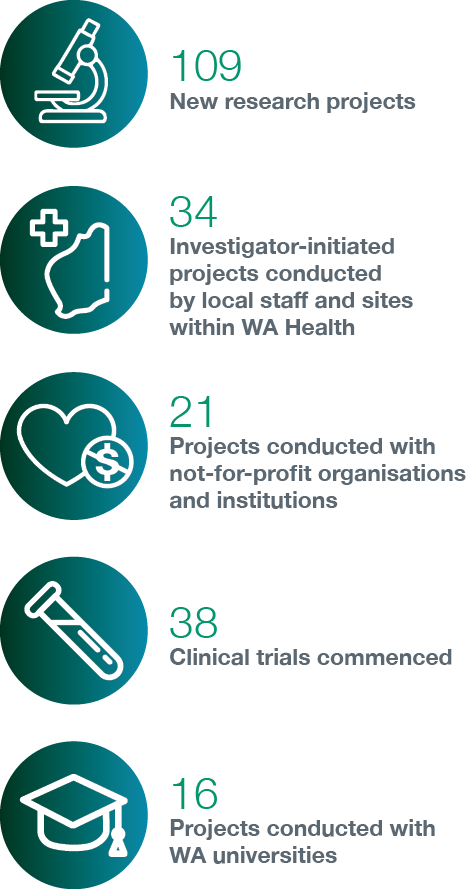
WA Scientist of the Year
EMHS is proud to celebrate the achievements of Professor Markus Schlaich, a joint winner of the Western Australian Premier’s Science Awards 2024: Scientist of the Year.
Professor Schlaich’s internationally-recognised, pioneering research into hypertension has led to advancements in blood pressure-lowering therapies, embodying EMHS’ commitment to innovation and excellence in health care.
The research was conducted at Royal Perth Hospital (RPH) and the University of Western Australia, in conjunction with the RPH Research Foundation.
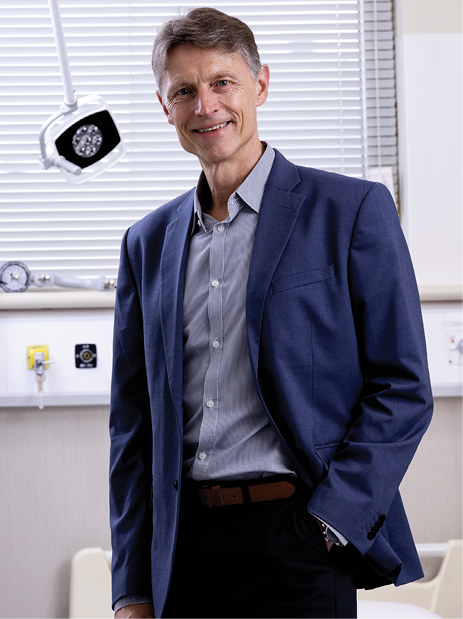
Preventing post-surgery complications
Associate Professor Andrew Toner, from the RPH Anaesthesia and Pain Management Department, has successfully recruited participants for his HYPE clinical trial into post-surgical complications.
HYPE has enrolled 95 participants and is well on track to complete the required 150 enrolments by the end of the 2025 calendar year.
The phase 2 pilot trial is examining pre-operative oral Roxadustat (Evrenzo) versus placebo in patients undergoing major elective surgery to assess the safety and effectiveness of the medication in reducing the number of people experiencing complications after surgery. It will also assess the feasibility of conducting a phase 3 international trial.
Post-operative complications are the third leading cause of death worldwide, with infective complications being particularly prevalent.
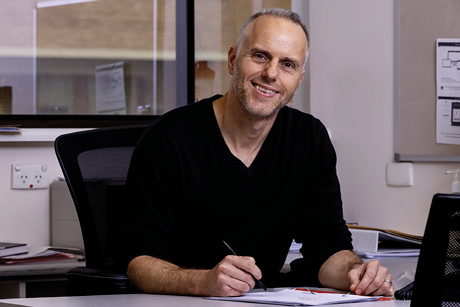
Research Innovation and Impact Grants
RPH Research Foundation Innovation and Impact Grants totalling more than $3.5 million have been awarded to 3 inspiring doctors and their teams this year, co-funded with the Future Health Research and Innovation Fund.
A Pathway to preventing leukaemia
$1,147,285
Coordinating principal investigator: Dr Hun Chuah.
Co-investigators: Prof Wendy Erber, Prof Michael Leahy, A/Prof Kathy Fuller, DSr Henry Hui.
Associate Investigators: Dr Peter Tan, Dr Tlene Kendrick, Dr Shao Tneh, Dr Belinda Guo, Dr Malcom Webb, A/Prof
Hasib Sidiqi.
With the incidence of blood cancers in Australia projected to almost double by 2035, principal investigator Dr Hun Chuah says there is a critical need for better early detection methods.
Leukaemia can arise spontaneously or secondary to chronic bone marrow disorder, with about 50,000 Australians currently living with this disorder and at risk of developing leukaemia.
Current testing methods are not sensitive enough to detect leukaemia before symptoms appear. By this stage − even with therapy − outcomes are poor.
To develop early detection strategies for leukaemia, Dr Chuah and his team have developed a groundbreaking test called Immuno-flowFISH, which analyses hundreds of thousands of cells per test and can identify selected cell populations with new genetic changes – even when only one in 100,000 has the abnormality.
“Our project came about because of our vision – that one day we can prevent leukaemia,” Dr Chuah says.
Artificial intelligence (AI) to improve outcomes after surgery
$1,179,424
Lead investigator: Prof Graham Hillis.
Investigator team: Prof Ferdous Sohel, Dr Janis Nolde, Prof Markus Schlaich, Dr Tim Bowles, Associate Prof Frank Sanfilippo, Adam Lloyd.
Associate Investigator: Ben Horgan.
RPH Cardiology Head of Department, Professor Graham Hillis knows even the smallest cardiovascular complications following non-cardiac surgery can spiral into bigger issues.
About one in three patients suffer some damage to the heart after non-cardiac surgery, which is associated with an increased risk of death and long-term adverse health outcomes.
Professor Hillis and his team are harnessing AI to assess risks to patients.
Part of the plan is to enable clinicians to track the risk of a patient through their operation and beyond, and sooner identify the patient whose risk is changing.
“We hope that by using AI, we can have systems that will warn clinicians and tell them why that risk may be changing and what they need to do to try and intervene and hopefully avert other problems,” Professor Hillis says.
Personalised place-of-care manufactured immune cells for blood cancer
$1,199,901
Coordinating principal investigator: Associate Professor Agnes Young.
Principal investigators: A/Prof Zlatibor Velickovic, Dr Benedict Carnley, Dr Melita Cirillo, Dr Collin Chin, Prof Michael Leahy.
Associate Investigators: A/Prof Hasib Sidiqi, Dr
Bradley Augustson, Dr Sung-kai Chiu.
More than 2,600 Australians were diagnosed with the incurable blood cancer, multiple myeloma, in 2023, with patients surviving less than 6 years from diagnosis.
Associate Professor Agnes Yong and her team propose to manufacture personalised chimeric antigen receptor (CAR) T-cells that target B-cell maturation antigen (BCMA) proteins on myeloma cells for patients who have exhausted all other treatment options.
The cells will be manufactured in their place of care, in this case at the Cell and Tissue Therapies WA (CTTWA) facility in the RPH campus.
“We will be able to do this at about 10 per cent of the commercial CAR T-cell cost,” Professor Yong says.
“We will therefore be able to prioritise treating our patients without delay, because in very advanced myeloma patients, delay results in death.”
The current cost is a prohibitive US $465,000 per patient.
Nursing and allied health grants 2025
The RPH Research Foundation this year awarded a total of $74,693 to 5 research projects designed to directly enhance patient care.
Emotional labour in healthcare: A targeted intervention for burnout management
Dr James Clark, $14,850, EMHS.
This project is trialling a targeted, group-based intervention program called Skills for emotional labour in health care), which aims to equip RPH and EMHS clinicians with practical tools to avoid and manage burn-out.
Health in a Virtual Environment (HIVE): The patient perspective of continuous remote monitoring in acute care
Rebecca Crellin, $14,907, EMHS.
The project is investigating how patients experience virtual monitoring through the HIVE program − an innovative model of care introduced at RPH in 2020.
Comparison of the efficacy and cost of central venous catheter fixation devices
Shirene Mattaboni, $15,000, RPH.
This project is comparing the performance of 2 widely used catheter securement devices to establish clear evidence that will guide clinical best practice at RPH.
A feasibility study on nurse sensitive outcomes in the mental health setting
Dr Irene Ngune, $15,000, Royal Perth Bentley Group.
A collaborative study to investigate which nurse-sensitive outcomes will bring the most benefit to WA’s mental health services.
Exploring the experiences of haemodialysis patients with arteriovenous fistulas and grafts in hospital settings
Monique Sandford, $14,936, RPH.
An investigation of the physical and emotional impact of vascular access care on patients who have received haemodialysis.
Raine Medical Research Foundation Clinician Research Fellowship
Doctor Martin Rabey was awarded a Raine Foundation Clinician Research Fellowship worth $303,652 in November for the study Changing the focus of musculoskeletal pain to strengths-based pain protection.
Recipients are co-funded by the Raine Foundation and the Future Health Research and Innovation Fund.
RPH Research Foundation Awards
EMHS researchers were recognised at the 2024 RPH Research Foundation Awards Day in October.
Dr Martin Rabey received the Professor Lyn Beazley AO Emerging Leader Award.
Clinical Nurse Gabrielle Calleja was awarded the 2024 Doreen McCarthy Nursing Research Award
for the project Exploring the patient’s experience when allocated to an isolation room to manage multi-resistant organism.
Dr Courtney Weber received the 2024 Early Career
Publication Award for her paper Analytically confirmed illicit and novel psychoactive drug use in Western Australian emergency departments, part of the groundbreaking Emerging Drugs
Network of Australia (EDNA) project.
RPH Senior Physiotherapist Dr Meg
Harrold received the Mentorship Award.
2024-25 innovation snapshot
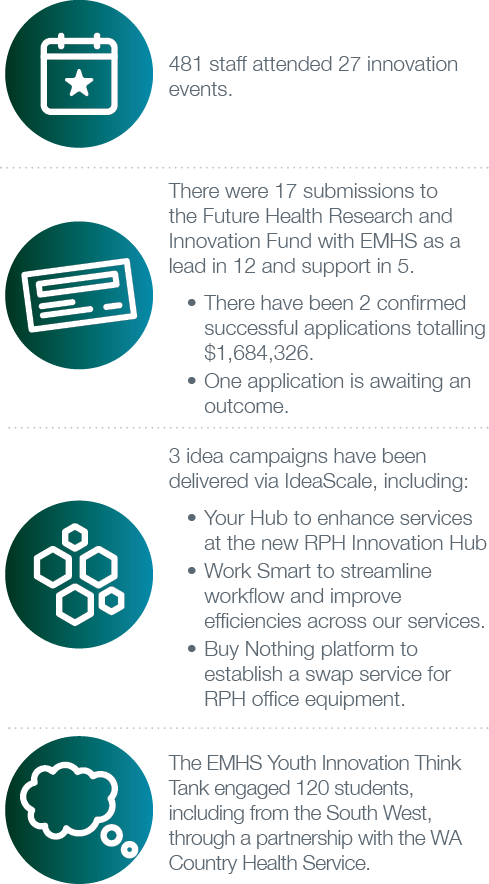
New RPH Innovation Hub
The new RPH Innovation Hub was officially opened by the Minister for Medical Research, the Hon Stephen Dawson MLC, in November.
Serving as the central space for the EMHS Innovation program, the hub offers a dynamic line-up of activities to drive innovation.
This financial year:
- EMHS Innovation has supported 17 projects with a human-centred design thinking project management approach. Human-centred design is an immersive approach to creative problem solving that focuses on the needs and requirements of end-users throughout the design process.
- An Innovation Champions program, designed to equip staff with the foundations for applying innovative practices across their own work and teams, has been well received, and we have also launched Innovation Power-Ups – 90-minute sessions with a deep dive on a specific skill related to human-centred design thinking.
- We have partnered with the WA Data Science Innovation Hub, Perth Biodesign, WA Life Sciences Innovation Hub, and WA schools through the Youth Innovation Think Tank.
- The Hub has hosted 18 professional development or workshop events with a total 322 attendees, 72 per cent from within our organisation and 28 per cent from outside.
Hub spaces include:
- a lab with 3D-printing and other equipment for building prototypes, supported by an innovation technical lead with engineering expertise
- a fit-for-purpose flexible space where new virtual reality projects can be tested and trialled
- 6 dedicated desks for staff working on innovation projects
- flexible work zones for collaborative and design work, accessible for all EMHS staff.
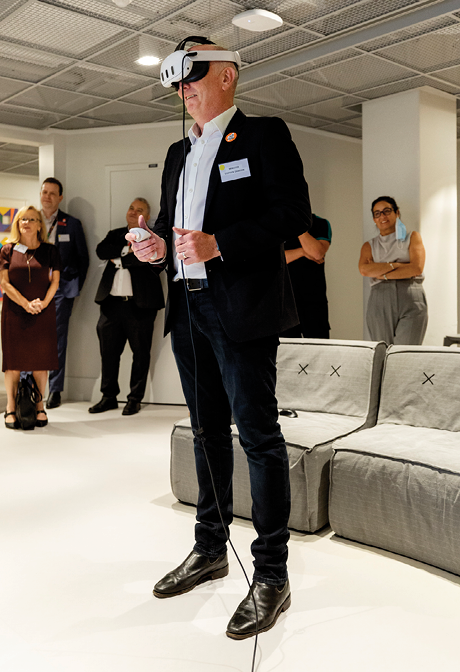
Reverse pitch with Perth Biodesign
We completed our first collaboration with Perth Biodesign via the University of Western Australia Master of Engineering course in October. Four student teams delivered pitches for bespoke products developed in response to clinical challenges laid down by our clinicians in February.
| Clinical needs statement | Proposed solution |
|---|---|
| A way to improve airborne pathogen isolation in space-limited hospitals to reduce transmission of airborne diseases | A 2-part device that attaches to the head and foot of a standard hospital bed to improve airborne pathogen isolation in space-limited hospitals to reduce transmission of airborne diseases. |
| A way for faster access to blood pressure in haemodynamically unstable adult patients in emergency departments, for faster administration of inotropic medication. | A non-invasive portable solution to provide accurate and constant blood pressure measurements to haemodynamically unstable patients in the emergency department. |
| A way to decrease the number of damaged cables in operating rooms to decrease the cost of lost resources. | An easily attachable and adjustable device designed to organise cables in the emergency department. |
| A way to test for jaundice severity outside of healthcare settings in discharged neonates to reduce costs associated with mild jaundice. | A screening tool for parents to monitor jaundice severity and progression in neonates over time, preventing unnecessary hospitals re-presentations. |
The EMHS and Perth Biodesign partnership was renewed in early 2025 and 8 EMHS clinicians pitched 13 challenges to the cohort of 37 Master of Engineering students. Students are now developing their proposed solutions to pitch to EMHS at the end of 2025.
Innovation internships
The first EMHS Innovation Internships program began in December 2024. The initiative offers EMHS staff the opportunity to access funding, time and professional support to develop and deliver pilot projects that align with our Innovation Strategy.
Three interns were supported in 2024-25.
RPH State Trauma Unit Senior Physiotherapist Claire Mullane is working on a project to improve lateral transfers within the trauma setting, specifically for bariatric patients who need to transfer from sitting on a bed to a wheelchair or commode.
Senior Podiatrist Rachel Carle, from the RPH Podiatry Outpatients clinic and Moorditj Djena, is focused on improving patient compliance with Controlled Ankle Movement (CAM) boots by simplifying the boot design without affecting its pressure reduction value.
State Rehabilitation Centre Senior Occupational Therapist Evana Jacobson is aiming to improve staff knowledge and uptake of assistive technologies for patients, including establishing a digital library of tools and services.

